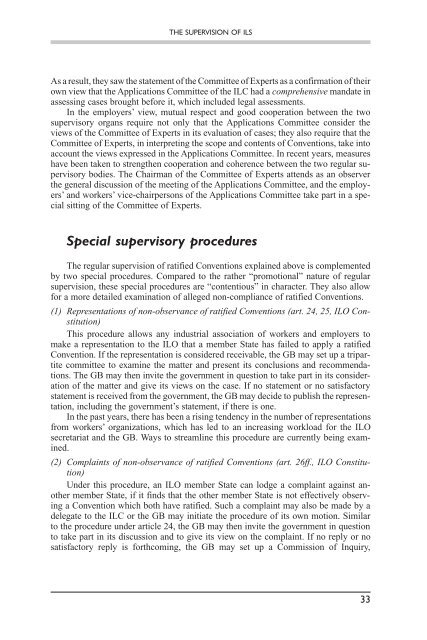Employers' Handbook on ILO Standards-related Activities
Employers' Handbook on ILO Standards-related Activities
Employers' Handbook on ILO Standards-related Activities
Create successful ePaper yourself
Turn your PDF publications into a flip-book with our unique Google optimized e-Paper software.
THE SUPERVISION OF ILS<br />
As a result, they saw the statement of the Committee of Experts as a c<strong>on</strong>firmati<strong>on</strong> of their<br />
own view that the Applicati<strong>on</strong>s Committee of the ILC had a comprehensive mandate in<br />
assessing cases brought before it, which included legal assessments.<br />
In the employers’ view, mutual respect and good cooperati<strong>on</strong> between the two<br />
supervisory organs require not <strong>on</strong>ly that the Applicati<strong>on</strong>s Committee c<strong>on</strong>sider the<br />
views of the Committee of Experts in its evaluati<strong>on</strong> of cases; they also require that the<br />
Committee of Experts, in interpreting the scope and c<strong>on</strong>tents of C<strong>on</strong>venti<strong>on</strong>s, take into<br />
account the views expressed in the Applicati<strong>on</strong>s Committee. In recent years, measures<br />
have been taken to strengthen cooperati<strong>on</strong> and coherence between the two regular supervisory<br />
bodies. The Chairman of the Committee of Experts attends as an observer<br />
the general discussi<strong>on</strong> of the meeting of the Applicati<strong>on</strong>s Committee, and the employers’<br />
and workers’ vice-chairpers<strong>on</strong>s of the Applicati<strong>on</strong>s Committee take part in a special<br />
sitting of the Committee of Experts.<br />
Special supervisory procedures<br />
The regular supervisi<strong>on</strong> of ratified C<strong>on</strong>venti<strong>on</strong>s explained above is complemented<br />
by two special procedures. Compared to the rather “promoti<strong>on</strong>al” nature of regular<br />
supervisi<strong>on</strong>, these special procedures are “c<strong>on</strong>tentious” in character. They also allow<br />
for a more detailed examinati<strong>on</strong> of alleged n<strong>on</strong>-compliance of ratified C<strong>on</strong>venti<strong>on</strong>s.<br />
(1) Representati<strong>on</strong>s of n<strong>on</strong>-observance of ratified C<strong>on</strong>venti<strong>on</strong>s (art. 24, 25, <strong>ILO</strong> C<strong>on</strong>stituti<strong>on</strong>)<br />
This procedure allows any industrial associati<strong>on</strong> of workers and employers to<br />
make a representati<strong>on</strong> to the <strong>ILO</strong> that a member State has failed to apply a ratified<br />
C<strong>on</strong>venti<strong>on</strong>. If the representati<strong>on</strong> is c<strong>on</strong>sidered receivable, the GB may set up a tripartite<br />
committee to examine the matter and present its c<strong>on</strong>clusi<strong>on</strong>s and recommendati<strong>on</strong>s.<br />
The GB may then invite the government in questi<strong>on</strong> to take part in its c<strong>on</strong>siderati<strong>on</strong><br />
of the matter and give its views <strong>on</strong> the case. If no statement or no satisfactory<br />
statement is received from the government, the GB may decide to publish the representati<strong>on</strong>,<br />
including the government’s statement, if there is <strong>on</strong>e.<br />
In the past years, there has been a rising tendency in the number of representati<strong>on</strong>s<br />
from workers’ organizati<strong>on</strong>s, which has led to an increasing workload for the <strong>ILO</strong><br />
secretariat and the GB. Ways to streamline this procedure are currently being examined.<br />
(2) Complaints of n<strong>on</strong>-observance of ratified C<strong>on</strong>venti<strong>on</strong>s (art. 26ff., <strong>ILO</strong> C<strong>on</strong>stituti<strong>on</strong>)<br />
Under this procedure, an <strong>ILO</strong> member State can lodge a complaint against another<br />
member State, if it finds that the other member State is not effectively observing<br />
a C<strong>on</strong>venti<strong>on</strong> which both have ratified. Such a complaint may also be made by a<br />
delegate to the ILC or the GB may initiate the procedure of its own moti<strong>on</strong>. Similar<br />
to the procedure under article 24, the GB may then invite the government in questi<strong>on</strong><br />
to take part in its discussi<strong>on</strong> and to give its view <strong>on</strong> the complaint. If no reply or no<br />
satisfactory reply is forthcoming, the GB may set up a Commissi<strong>on</strong> of Inquiry,<br />
33

















